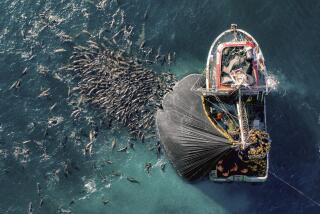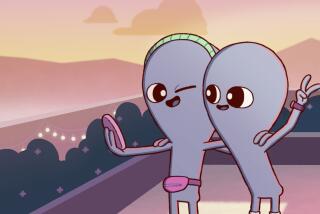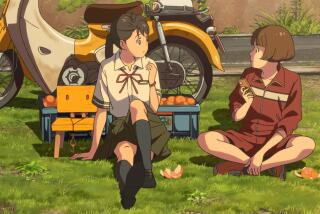Evoking a sense of wonder
- Share via
After about 10 minutes of the documentary “The Sacred Balance,” David Suzuki’s poetic, glacially paced paean to the environment, you may be tempted to hop into your SUV, head onto the highway and fling lighted cigarettes out the window.
That would be utterly wrong, of course. It also wouldn’t allow the four-part series (Part 1 airs tonight at 8 on KCET, with the others in the same time slot over the next three Wednesdays) to find its peculiar rhythm.
Though the show -- based on the book of the same name by Suzuki, a veteran geneticist, environmentalist and broadcaster, and his longtime collaborator Amanda McConnell -- can be maddeningly repetitive and downright dull, at times it evokes the sense of wonder that must have driven Suzuki inescapably to his main point: We are creatures of the Earth, not rulers of it. Whether his vision of humanity’s place in an interconnected world is as radical as Suzuki seems to believe, his guided tour hopscotching five continents could hardly be more expansive or contemplative.
In the opening episode, “Journey Into New Worlds,” Suzuki takes us to Arizona, Massachusetts, Britain and Western Canada in an effort to frame his view of the planet and our place on it. Along with scientists, an astronaut and a cardiologist, we meet a leader of the Haida people who first showed Suzuki how humans are inseparable from the forest and the rest of the natural world, setting him on his path. Reflecting on his own career journey, Suzuki contrasts Isaac Newton’s “reductionist” science with the spiritual understanding fundamental to the Haida view.
The second episode, “The Matrix of Life,” explores the dynamic and essential relationship between air and water, from the banks of the Ganges River to the desert oasis of Las Vegas.
Next comes “The Fire of Creation,” a look at how the cosmos came to life 13 billion years ago with a single Big Bang, and how today the furnace of the sun continues to feed the cycle of production worldwide. In soil, the planet’s energy cycle comes full circle as death turns into life.
In the conclusion, “Coming Home,” Suzuki examines the need for love and spiritual connection that seems as vital to humans as air, water, earth and fire.
In spite of its occasional self-indulgence, this four-part essay is often most effective when it is most personal. One such moment comes tonight when Suzuki takes his grandson, Tamo, to visit a swamp instead of another video arcade, and the boy catches a frog in midair. Suzuki says the reptile looks old and wrinkled, to which the boy innocently replies, “Like you.” His grandfather’s laugh says plenty about the joy of nature.
More to Read
The complete guide to home viewing
Get Screen Gab for everything about the TV shows and streaming movies everyone’s talking about.
You may occasionally receive promotional content from the Los Angeles Times.






